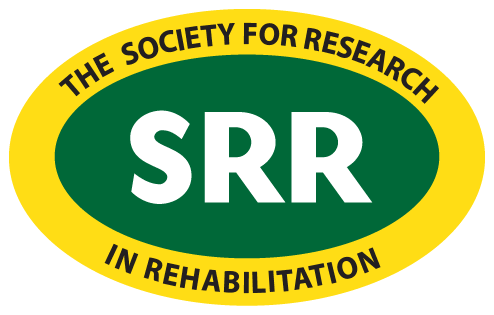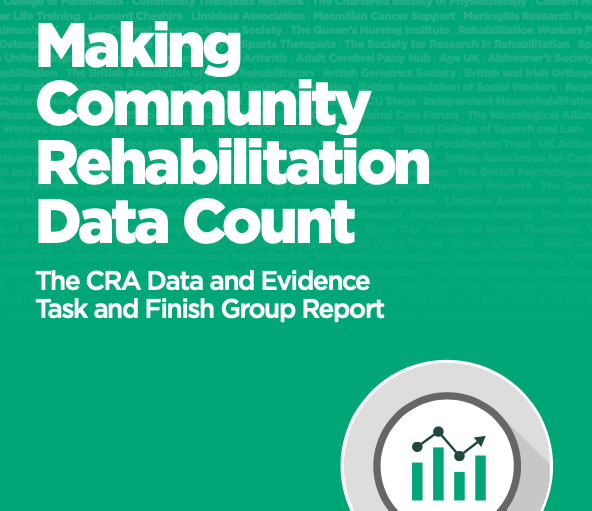Community Rehabilitation Alliance (CRA) Standards and Data Group Report
The SRR is a member of the Community Rehabilitation Alliance (CRA). The alliance is a partnership of more than 50 charities and professional bodies who are all committed to improving commissioning, planning and delivery of rehabilitation.
Community rehabilitation has long been recommended as a system to provide the appropriate input to people outside of hospital type environments. Rehabilitation in the community has a wide remit and includes people who have a varied and large range of health conditions. All community rehabilitation services are historically under-resourced and over-subscribed and the data systems to support such services are often lacking or poorly supported, particularly in terms of commissioning such services.
Community rehabilitation is defined as all rehabilitation delivered to a patient in any setting outside a hospital. This description includes rehabilitation delivered by health or social including in rehabilitation in community hospitals or care homes. It is provided by a multidisciplinary team, to optimise function, social participation and improve health and includes biopsychosocial assessment, information provision, patient activation (i.e. Building knowledge, skills and confidence), shared decision making, goal oriented interventions, support for self-management and opportunity for behaviour change.
The Community Rehabilitation Best Practice Standards emphasis seven core recommendations to ensure appropriate service delivery to people with rehabilitation need:
Recommendation 1 — Referral processes are explicit, easy, efficient and equitable
Recommendation 2 — Rehabilitation interventions are timely, co-ordinated and prevent avoidable disability
Recommendation 3 — Rehabilitation interventions meet patient needs and are delivered in an appropriate format
Recommendation 4 — Rehabilitation pathways should meet needs and be delivered as locally as possible with access to specialist services
Recommendation 5 — Rehabilitation Programmes should enable optimisation, self-management and review
Recommendation 6 — Rehabilitation services are well led, adequately resourced and networked to other services
Recommendation 7 — Rehabilitation Services involve Families
The Community Rehabilitation Data Group (supported by SRR council) used a multi-methods approach to gather insight from CRA member organisations and community rehabilitation service providers to:
- Explore how and why community rehabilitation commissioners and services currently use databases and identify gaps in data use.
- Explore the characteristics and types of data that could be included in an ‘ideal core dataset’ to identify needs and inform solutions.
Our resulting recommendations are that a community rehabilitation database must be simple to use, safe, efficient and hosted centrally. Such a database should be co-designed with stakeholders to reduce data entry duplication and foster data sharing. This, in turn, could help map service need and outcomes, support audit, service evaluation and research and improve integration of community services (including partnership working between acute, specialised rehabilitation, long-term and social care).
NHS England and NHS Digital have a key role in supporting, funding and delivering a community rehabilitation central database including associated hardware and software. Without coordinated support, a national data collection system is unrealistic and indeed might be detrimental to service delivery given the unsupported clinical and managerial time costs required.
It is very apparent, having undertaken evaluation and consultation, that data is seen by clinicians (of all disciplines), commissioners, service users and health and social care organisations (both statutory and third sector) as critical to service planning, provision, and ongoing research. Without such data there is a barrier to providing the most appropriate rehabilitation to those who need it, with significant cost implications to society if rehabilitation input is lacking.
Dr Stephen Ashford
SRR Senior Secretary
Consultant Allied Heath Professional, Specialised Community Outreach Service, Regional Hyper-Acute Rehabilitation Unit, Northwick Park Hospital, London North West University Healthcare NHS Trust, London, UK
Senior Clinical Lecturer, Department of Palliative Care, Policy and Rehabilitation, The Cicely Saunders Institute, King’s College London, London, UK.
The SRR expresses their thanks to Dr. Stephen Ashford and Dr. Ingrid Wilkinson for their contribution to the important work undertaken by the CRA.

